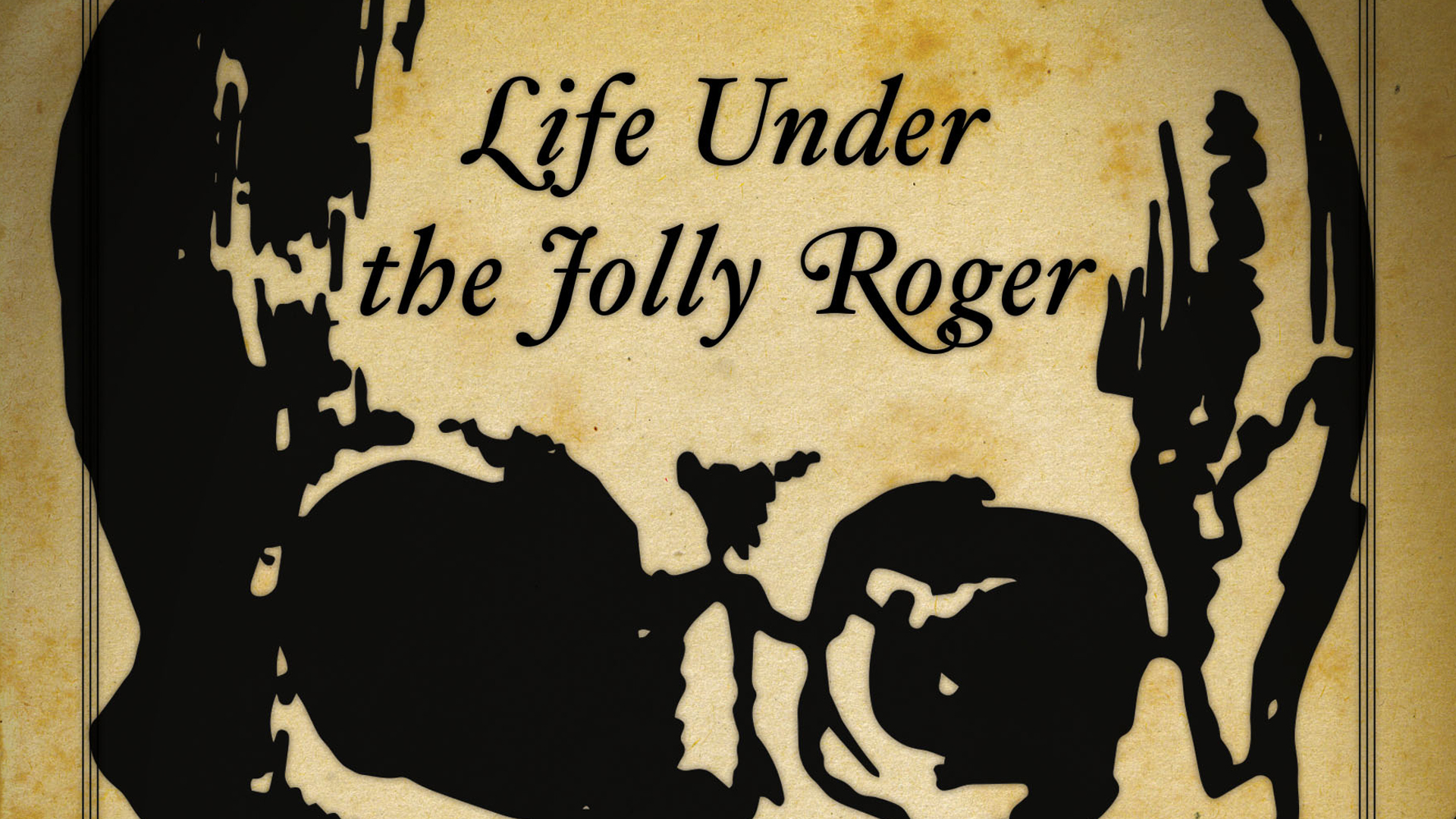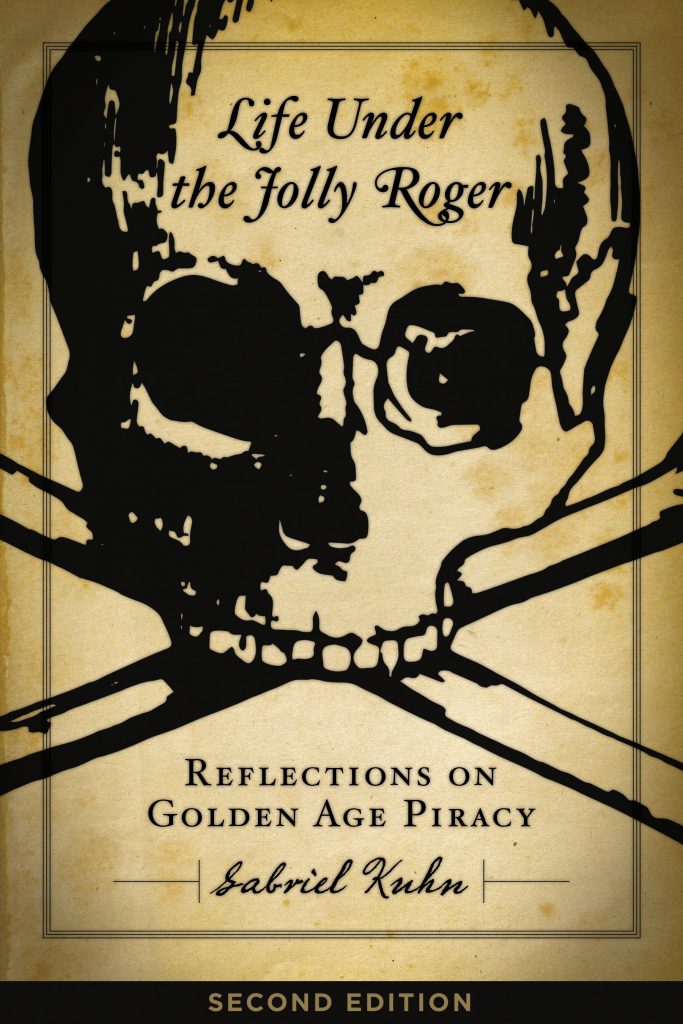Darkmatter interview with Gabriel Kuhn
December 20th, 2009
In November 2009, PM Press released Gabriel Kuhn’s Life Under the Jolly Roger: Reflections on Golden Age Piracy, a study analyzing the most legendary pirate era from ethnographic, sociological and political angles. Gabriel Kuhn is a writer and translator who currently resides in Sweden. He holds a Ph.D. in philosophy from the University of Innsbruck, Austria. Nora Räthzel, sociologist at the University of Umeå, Sweden, has interviewed him about his upcoming book.
For those not too familiar with pirate history: what is the golden age?
The golden age refers to the heyday of the piracy that emerged in the Caribbean in the late 17th century before spreading to the Indian Ocean and eventually to the west coast of Africa. Basically all of the popular Euro-American pirate images derive from this era, whether we encounter them in Robert Louis Stevenson’s Treasure Island or in Disney’s Pirates of the Caribbean. The Jolly Roger, the most powerful of all pirate symbols, stems from the golden age too. Historians give the era different frames, but we are roughly looking at the period from 1690 to 1725.
Why did piracy become so strong then?
Sea robbery had occurred in the Caribbean for more than a hundred years prior to the golden age. In the 16th century, when the run for the colonies in the Caribbean and in the Americas began, European powers sent sea robbers as a sort of unofficial mercenary force to the region to plunder ships of their colonial rivals. As legend has it, Francis Drake was called “my pirate” by Queen Elizabeth.
In the 17th century, an outlaw hunting community gathered on the island of Hispaniola, today divided into Haiti and the Dominican Republic. The community consisted of marooned or shipwrecked sailors, runaway servants and slaves, adventurers and dropouts. They were called the buccaneers after a meat-smoking practice they adopted from the indigenous Carib Indians. When they took to sea robbery to supplement their income, they began serving a similar role to the likes of Drake, being issued with a “letter of marque” by one colonial power and attacking ships of another. Eventually, some buccaneer expeditions gained military-like dimensions, the successful 1671 attack on Spanish-ruled Panama under Henry Morgan serving as the most famous example.
By the end of the 17th century, colonial policies had changed enough to render the buccaneers’ services increasingly less important. This left many of them without an income. As a consequence, they continued their attacks on merchant ships indiscriminately and turned, in the words of some historians, into “pirates proper”: a community of sea robbers who would no longer serve a particular master but who “waged war on the whole world,” as Captain Charles Johnson’s General History of the Pirates famously puts it. This was the beginning of the golden age.
For three decades the golden age pirates were surprisingly successful. Then they were crushed by combined efforts of the powers that had created them. It’s a scenario very similar to many we see today: governments equip men to fight in their interests – and then criminalize and persecute them when they are no longer useful.
So golden age piracy is directly bound to colonialism?
Most certainly. Without European colonization there wouldn’t have been a golden age of piracy. And not only because Europeans wouldn’t have traveled to the Caribbean or to the Indian Ocean, but also because golden age piracy was a direct result of activities that were financed and encouraged by colonial powers.
The relations between the golden age pirates and the colonial era are complicated, because once pirates started to prey on ships of all nations they began to pose a threat to the economic profitability of the colonies and therefore to the colonial enterprise itself. However, this doesn’t change the fact that they are an inherent part of the colonial legacy. To portray golden age pirates as some kind of anti-colonial force seems misleading. Many of the pirate strongholds of the golden age – in the Caribbean, on Madagascar and along the West African coast – functioned as renegade colonial outposts. True, they were not established under the flag of any European nation state, but they still reinforced the control of Europeans over native populations.
Can you elaborate on this? Some historians have claimed that pirate crews overcame the racial prejudices of their times?
Whenever we talk about what golden age pirate crews did or did not do, we are facing a serious problem, namely a lack of reliable sources. We have no logbooks, diaries, letters – not a single document that would provide an “authentic” image of what life was like on their ships. All we have is what in a court of law would go as “circumstantial” evidence: newspaper articles, court transcripts, governmental records.
This leaves the role that non-Europeans played on golden age pirate ships very unclear. On the one hand, there are indications that some Caribbean Indians and Africans who sailed on pirate ships were full crew members, sometimes very respected ones. On the other hand, there are many indications that Indians and Africans were used as laborers or servants. It is interesting to note that when the British Navy hunted down the most notorious of all golden age pirate captains, Bartholomew Roberts, basically all of his nearly two hundred European crew members were brought to trial, while the seventy-five Africans were sold into slavery. This might just reflect the attitudes of the British officials at the time – but it might also indicate the status these men really had.
I think it is true that pirate crews offered a chance for non-Europeans to live relatively free lives when this was practically impossible anywhere else within European society. It must also be true that the lure of freedom that drew Europeans to piracy drew runaway slaves to piracy too. So I’m not denying that there has been an element of transgressing racial limitations in the pirate experience. However, to portray golden age pirate communities sweepingly as “multiracial” or “post-racial” seems very bold to me.
Can you say something about the relations between the golden age pirates and the slave trade?
Again, it’s not a clear-cut issue. It seems well documented that some of the golden age pirates’ strongholds doubled as slave trading posts, especially in Madagascar and West Africa. According to the records, it also seems likely that slaves were mostly considered cargo like any other when pirates took a slave ship and that they were sold at the next best opportunity.
At the same time, it is unlikely that all golden age pirates were involved in the slave trade. Some Africans sailing as full crew members makes it appear improbable that slaves would have been treated as mere commodities on their ships. Then again, freeing some slaves didn’t end slavery in the US-American South either… We simply don’t know.
Some historians have suggested a strong anti-slavery moment among golden age pirates because they disrupted the slave trade that developed in West Africa. This is a questionable conclusion. It is true that the pirates’ activities disrupted the slave trade and that this was one of the reasons why the authorities became ever more determined to hunt them down. However, we are not talking about an interference based on enlightened moral values here. The pirates interfered with the slave trade in the same way that organized crime interferes with alcohol or tobacco sales: the pirates hurt the official slave trading industry by claiming a share of its profits – not by challenging the trade per se.
It has also been suggested that some golden age pirates attacked slave ships to free all Africans on board. Even if this is true – and the stories don’t seem very convincing to me – such events must have been exceptional.
Golden age pirates have been described as communities transcending national boundaries too. Would you agree?
The concept of the nation is a difficult one to deal with. If we speak of nation states, yes, the golden age pirates defied this concept and all that goes with it: citizenship, borders, administrative rule. The Jolly Roger remains a powerful symbol in this sense alone. Did the golden age pirates lose all sense of national identity, though, as in: all sense of belonging to a particular group of people united by language, geography, heritage, or whatever else can be used to construe a “nation”? Hardly so.
It is true that in certain ways golden age pirates overcame the national boundaries that were still characteristic of the buccaneer communities. In the golden age, Anglo-American, French and Dutch pirates fought together rather than against one another. However, most other nationalities remain conspicuously absent from golden age pirate ships, most notably the Spanish. The main colonial rivalry of the Americas was hence still reflected in the makeup of the pirate crews. In general, the multinational melting pots that golden age pirate crews are sometimes made out to be seem overrated. The overwhelming majority of golden age pirates were Anglo-American. There were significant numbers of French and Dutch pirates, but only a smattering of pirates from other European nations, and some Indians and Africans. Arguably, the population of most colonies at the time was more diverse than golden age pirate crews. True, national identity among the pirates might have been more flexible, horizontal and egalitarian, but prejudices and conflicts certainly remained.
In short, given the absence of a nation state as an authoritarian unifying concept, there was definitely an anti-national streak in golden age piracy and its political significance must not be neglected. Yet, to imagine a utopian paradise where national allegiances of all sorts had evaporated seems to simplify matters.
It appears, though, that this anti-national streak was a very characteristic feature of golden age piracy – also one that would distinguish the golden age from other pirate eras.
It is at least related to what I would call the most distinguishing feature of golden age piracy, namely its nomadism. This aspect is missing in all other great eras of piracy, whether we are talking about piracy off the North African coast in the 16th century, piracy in the South China Sea in the 1800s, or piracy along the Somali coast now. Golden age pirates had no home, no permanent land base, no community they were part of, could retreat to and disappear in. When asked where they came from, they famously replied “From the Sea.” They had safe havens, allies and business partners on land, but these ties were merely pragmatic and very fleeting.
The nomadic aspect of golden age piracy is very unique – and very fascinating, in many ways. It is the reason why all of our popular pirate images relate to this era: the golden age pirate, more so than any other pirate, is the ultimate outlaw, one who has cut of all ties with the conventions of a bourgeois life: home, security, stability. No surprise then that he’s been such a common focus of projection: both by the bourgeois who sees his secret desires fulfilled, and by the radical who finds her dreams of liberation materialized.
The final part of your book discusses the political legacy of golden age pirates and whether they can inform contemporary radicals. Can they?
Well, they obviously do. Look at how present the Jolly Roger is in radical circles: it adorns autonomous spaces, appears on anti-globalization rallies and is a favorite in any radical art show. The question is whether this is mere romanticism or whether there is any substance to back up such adaptation. I think this is an important distinction to make. Nothing against romanticism, but when it becomes a dominant force in politics it can prevent both complex analysis and convincing vision.
I do believe that there is substance behind the radical embrace of golden age pirates. Certain characteristics must appeal to any radical endeavor: 1. an uncompromising defiance of authority; 2. risking one’s life for freedom rather than saving one’s life in chains; 3. setting a remarkable example of direct democracy (the egalitarian organization of pirate crews is not disputed even by the most conservative historians).
However, golden age pirates were no model revolutionaries, no principled socialists, no perpetrators of a class war. I think that we can learn much more from golden age pirates if we take their shortcomings into account rather than making unsupported claims. The most important shortcomings seem to be: 1. a lack of moral perspective beyond an immediate group of peers; 2. a lack of social organization beyond the confines of one’s own ship; 3. a lack of long-term political vision; 4. an economic dependency on one’s enemies. In short, the golden age pirate communities were not sustainable. They had no inherent mechanisms for reproduction, preservation, progression. It is telling that they lasted for but one generation.
Your book covers a lot of ground – we have talked about colonialism, nationality, race, radical politics, and there are chapters on gender, sexuality, disability, Friedrich Nietzsche etc. How do all these parts tie together?
By reflecting upon golden age piracy from many angles, I’m trying to add perspectives that might not have been voiced before. Due to the mentioned lack of first-hand sources, the study of golden age piracy involves endless speculation. Of course certain theories are much more plausible than others, and spouting random nonsense is as meaningless, boring and offensive as claiming a truth that isn’t there. But the inevitability of speculation is part of the pirate mystique and an important factor for our never-ending fascination with the subject.
It is really important to note, though, that this is not a historical book. I am no historian and by no means do I want do compete with the people who have done marvelous work in the field, scholars like Marcus Rediker, David Cordingly and others. My work is entirely indebted to theirs. They’ve unearthed the material that I’m using for my interpretations. Some of my interpretations might differ from theirs, but how are you going to contribute to a debate if you don’t dare to differ?
Nora Räthzel is a sociologist and the university of Umeå, Sweden. Her research interests are trade union policies regarding the north-south divide and environmental issues, everyday life in cities, and workers in transnational corporations in the north and the south. Beyond that she reads (almost) everything Gabriel Kuhn writes and thus expands here interests.







